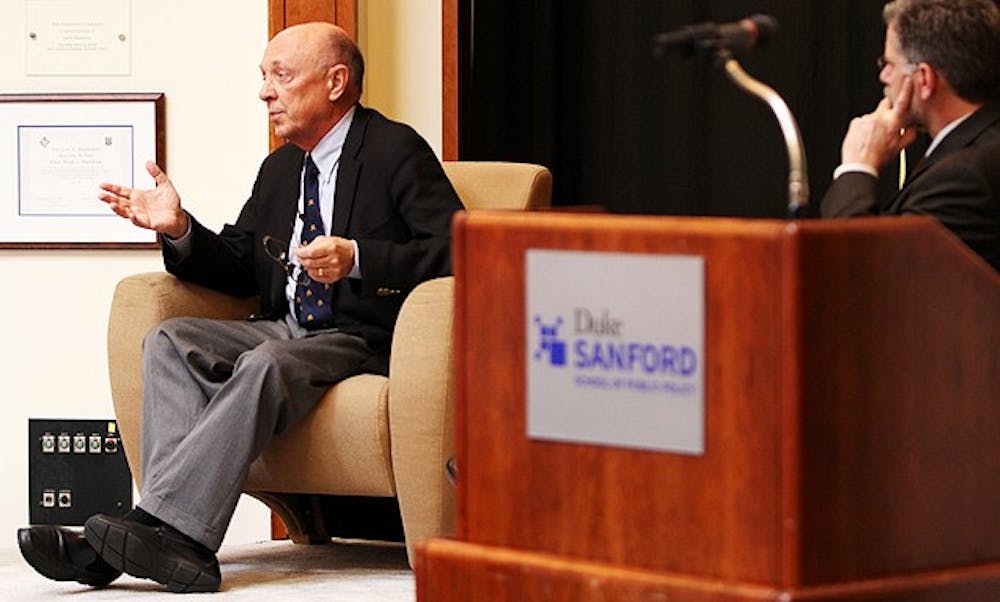Reducing dependence on fossil fuels is key to the United States’ national security as well as its environmental health, said a leading energy expert Wednesday.
Former CIA Director R. James Woolsey led a discussion about the intersection of energy and security policy and the importance of reducing the United States’ reliance on fossil fuels, particularly in transportation.
“That domination of transportation by petroleum, along with OPEC’s domination of three quarters of the world’s reserves of conventional petroleum… completely dominates and manages our access to transportation,” Woolsey said.
Richard Newell, Gendell associate professor of energy and environmental economics and director of the Duke Energy Initiative, also contributed to the discussion.
Reliance on OPEC nations for petroleum to fuel vehicles, along with the political instability in many oil-producing countries, creates a very serious national security dilemma, Woolsey said. A crucial way to solve this problem is to wean transportation off petroleum.
Woolsey currently serves as chairman of Woolsey Partners, LLC and as a venture partner with Lux Capital Management.
“There is no way to break OPEC by drilling for oil,” he said. “There is no way out of this other than to switch transportation away from petroleum.”
Using abundant supplies of natural gas in the United States to produce methanol for vehicles can also significantly reduce dependence on fossil fuels, Woolsey said. Incorporating methanol, which can easily be synthesized from natural gas, into the fuel supply can reduce the price of fuel by up to 40 percent.
“We are currently drilling so much natural gas [that] prices are dropping to the point where drillers are picking up their rigs and drilling for oil in North Dakota,” Woolsey said. “The most likely major expansion of demand for natural gas is to make methanol.”
Switching primary fuel sources to natural gas, and eventually renewable sources of energy, will help mitigate global climate change, which is itself a national security issue, Woolsey said. An example of a security problem to the United States posed by climate change could be a future mass migration from Latin America due to water shortages.
Securing the national energy supply also requires improving the electricity grid, which is highly susceptible to hacking, physical attack and electromagnetic pulse, Woolsey added.
“If the electric grid goes down, no one has more than a few weeks of diesel for generators at places like hospitals, police stations and military bases,” he said. “If a grid goes down, a civilization goes down.”
Choosing Woolsey to speak about the relationship between energy, the environment and national security was an easy decision, Newell said.
“We couldn’t think of anybody more exciting or knowledgeable, more perfectly involved at the intersection of energy and security than Mr. Woolsey,” he said.
Audience member Greer Mackebee, a senior, said he found Woolsey very knowledgeable, not only about security but also environmental issues.
“I was pleasantly surprised by how knowledgeable he was about clean tech,” Mackebee noted.
Mackebee said his academic background in civil and environmental engineering as well as his concern for the world’s energy future, attracted him to the event Wednesday.
“The way energy will develop over the next 10 to 25 years is one of the most important societal problems we will face,” he added.
The lecture was jointly sponsored by the Triangle Institute for Security Studies, the Sanford School of Public Policy, the Duke Energy Initiative, the Nicholas Institute for Environmental Policy Solutions, the Duke International Relations Association and the Duke Program in American Grand Strategy.
Get The Chronicle straight to your inbox
Signup for our weekly newsletter. Cancel at any time.

